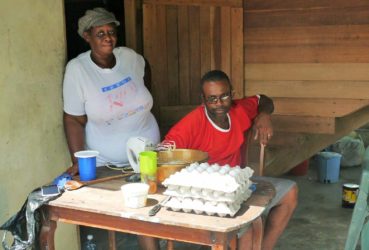While many are having a cheerful Christmas, some residents of the Wales, West Bank Demerara community are worrying about their future.
When Stabroek News visited the area on Thursday, a few houses were scantily decorated and some showed no indication at all that Christmas was in the air.
Annie Goodluck, a resident, said, “Christmas used to be bright for me but not this year at all…”
She did not decorate as usual and even if she was willing to celebrate, she did not have the money to do so. She said her husband, Orette Goodluck, a tractor operator, who worked at the estate for 22 years, “did not get his back-pay.”

According to her, he had wanted to leave the work at the estate a few years ago but she “encouraged him to stay because of the benefits but now he has nothing to get.”
Annie said she and her husband were “worried about our future, even though we don’t have children, much less those who have. But we have bills to pay.”
A housewife, Asha Khan, said her husband, Sanjay Khan, 47, a driver at the estate with 27 years of service has had no luck in finding another job.
She said “it would be hard” to take care of their four children, the youngest of whom is five.
She too feels “disappointed” that the estate had to be closed and that government did not listen to the pleas of the people to keep it going.
David Persaud, who had 23 years of service and is the father of two school-aged children, applied at several places for a job. When he calls to follow up he keeps receiving promises that “they would call me back.”

When Stabroek News caught up with him, he was about to go out with his family. He described the area as “dead. The lil bit [money] people have they use it for food to survive. I don’t know what would happen after.”
He said if the government gave the land as promised, for them to farm and supply the diversification project, he would take it. But since no one has told them anything official as yet with regard to that, he was skeptical.
In January this year, government announced the planned closure via a press release.
To date, neither the government nor the Guyana Sugar Corporation (GuySuCo) has given the hundreds of Wales workers who are now without jobs any concrete information on diversification or alternatives at the estate.
The government and GuySuCo have been repeatedly pressed to provide this information but there appears to be nothing solid.
The workers and their families, with support from the main sugar union, the Guyana Agricultural and General Workers’ Union, held several protests, marches and candlelight vigils in an effort to get the government to visit them.
Some 1,700 workers have been displaced, with 92 of them receiving severance pay.
GuySuCo has started discussions with a “couple hundred” cane harvesters, offering them jobs at Uitvlugt, but many of them feel it would be too far for them to travel.
Back in January, a housewife whose husband is employed at the estate, had told this newspaper that when they heard about the closure, they kept praying and hoping it was not going to happen. They were afraid of the impact the closure would have on them.
They cried early Sunday morning when they heard the sounding of the horn that signalled the closing of the estate.
Sultan Hussain who operated the mill turbine, told Stabroek News the “horn blow for about five minutes,” indicating that the “last bundle of cane was lifted.” On Thursday the last batch of sugar was taken out of the estate.
He said the closure “would affect the whole West Bank and the country at large.”
Blue Christmas
Another worker who wished not to be named, said it would be a “blue Christmas for the Wales workers and for all sugar workers for that matter… We used to get a wage increase but this is the second year they [GuySuCo] took it away.”
He added, “Now they took away our API. And that’s not all, the little work that we have here, they taking it away.” He too was unsure of his next move.
He pointed out that “the village does be bright around this time… Last year it was bad, but this year it is worse and we are afraid of what next year holds. Everybody seems [to be in] despair.”
He said GuySuCo has a few hundred acres of fully matured cane remaining in the fields that could last for over 10 weeks grinding but it has been abandoned.
The workers are still to receive a month’s notice from the estate and then they may hear about the severance payments and the plans to diversify.
Frederick Spencer, a cane harvester, said at Christmastime he would be in the spirit to celebrate and would “decorate his home and play carols from long before.”
This time though, he “can’t have Christmas because we didn’t get extra money to shop, although the factory make the target… last year too.”
Linden Toney, a boiler charge-hand with 24 years of service, was on duty to witness the final operation and he, too, burst into tears.
Being the “breadwinner of the home” and the father of a son who is sitting the Caribbean Secondary Education Certificate exams next year, he thought about the impact the closure would have on his family.
He is worried about the utility bills he has to pay, providing food and other basic necessities and most of all, about finding another job.
“Now they bringing VAT on the water and light bills. The minister [of Finance, Winston Jordan] said that if you pay less than $10,000 for light and $1,500 for water you don’t have to pay VAT, but I can show you my bills, I pay more than that for both,” he told this newspaper.
Besides, he said, the Guyana Power and Light “don’t give you a chance when they are ready to disconnect you.”
At age 51, he is not sure if he would find employment and said he had been “looking forward to a good pension at the estate.”
His wife Wanica said she was at home when she heard the sound of the whistle and she knew it was the last she would be hearing it.
“My heart rate started to increase and I felt sad for my family, for all the mothers with small children and for the women who are not working, knowing this month would be the last pay from the estate,” she said sadly.
The couple pointed out that the final whistle blast was one which was normally associated with sadness, explaining that whenever a worker died and “the funeral was passing the horn would blow like that.”
Wanica feels “a lot of things would start happening in the area now,” referring to stealing that may be as a result of unemployment. But she is praying and hoping for the best.
Although their shopping for Christmas was done on a tight budget, Wanica would not let that spoil her fun and she plans to have a good time because “Christmas is the best time of the year for me.”
When this newspaper stopped by, the couple and their daughter were busy making their Christmas cake.
Toney recalled that the Sunday morning when he found out about the closure, he was not planning to go to church. But after reading the newspaper article he “ended up going because I had to turn to God for direction.”
Shaheed Khan, 70, who started working at the estate from a young age and retired in 2007, recalled that “many people came from Berbice and different parts of Guyana to work at this estate.”
He said, “Some came without families and just a little clothes and they could have owned houses in this locality just by cutting cane.”
He also mentioned that cane was abandoned in the fields and commented that it was growing better after they stopped fertilizing it. He speculated that “something was going on before.”
He added: “It is not that the estate can’t produce. What I feel is they should have done was to give the private farmers the land to plant.”
According to him, the farmers had a yield of 40 tonnes per acres while the estate was only getting 20 and suggested that too much chemical was being used.





